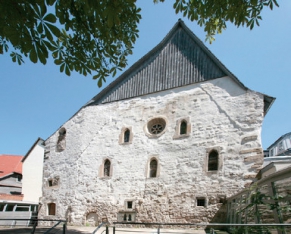|
World Jewish News

Photo by .erfurt-tourismus.de
|
Four Jewish sites compete for German selection for UNESCO World Heritage status
07.08.2012, Culture Four Jewish sites are under consideration by a Germany committee for proposal as UNESCO World Heritage sites, it has been announced. The locations, which comprise Jewish cemeteries in Berlin and Hamburg, the Old Synagogue of Erfurt and the federation of SHUM cities, are amongst a group of 24 German historical sites to be considered by a German board for recommendation to the UN’s Educational, Scientific and Cultural Organisation as a place of global cultural significance.
Thirty-seven German locations are currently included on the list of World Heritage sites, although as none of those are of Jewish significance, neither are the 10 others already under UNESCO consideration, the four would represent the first German Jewish sites to be included on the list, should any application come to fruition.
Other sites under consideration in Germany include The Palace of Justice, the location for the infamous Nuremberg Trials, a series of high-profile military tribunals held by the victorious allied forces to prosecute prominent wartime Nazis. The Palace of Justice was specifically chosen to house the trials, as the city was known as the ceremonial birthplace of Nazism in Germany.
Israeli leaders slammed last month’s “politically-motivated” UNESCO decision to place Jesus’ birthplace in the Palestinian Authority (PA)-led West Bank territory of Bethlehem on an endangered list. PA President Mahmoud Abbas had controversially fast-tracked the application for the site’s inclusion by claiming the location was at risk “due to the continued Israeli occupation of the territory”.
Israeli Premier Benjamin Netanyahu issued a statement declaring the vote as "proof that UNESCO is motivated by political and not cultural considerations," invoking Abbas’ acknowledged plan to achieve world recognition of the West Bank, Gaza and east Jerusalem as the basis of a Palestinian State, starting with UNESCO recognition of the most commonly recognised landmark in the Christian world.
The Simon Wiesenthal Centre similarly protested against the UNESCO vote, calling on the organisation to grant similar recognition to the Argentinian Jewish rural community of Moises Ville.
The town (whose name, signifying ‘City of Moses’, draws from the biblical exodus of the Jewish people from Egypt) was established by Ukrainian Jews fleeing pogroms, was set up as an agricultural colony on drought-ridden land and became a success in spite of itself, with the Argentinian authorities declaring it a ‘pueblo historico’ (historic village) on the 100th anniversary of its creation.
Despite the fact that many of the founders then migrated to larger cities in Argentina, or to the Jewish State, the Centre highlighted that its Jewish historic and cultural heritage had been preserved for the benefit of greater Argentinian society. Pointing out how “world Jewish heritage is clearly of national significance to many UNESCO member-states”, the Simon Wiesenthal Centre’s Director for International Relations, Shimon Samuels concluded that: “the inscription of Moises Ville would represent acknowledgement of a diasporic best practice as an example for the sites of other ethnic and faith migrant communities around the world”.
by: Shari Ryness
EJP
|
|
